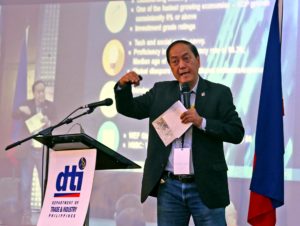
DTI SLINGSHOT FORUM/OCT. 23, 2018: Mr. Senen M. Perlada, Department of Trade and Industry (DTI)-Export Marketing Bureau, director discusses Scale Up program for Starups Born Global during DTI’s Slingshot Cebu forum in City Sports Club.(CDN PHOTO/JUNJIE MENDOZA)
Cebu still needs to catch up in terms of cultivating its startup community, experts say.
Frederick Amores, assistant regional director of the Department of Information and Communications Technology (DICT) in Visayas, said they would need to see more startup companies that would be able to gain investors in their ventures.
“Cebu is not yet there in terms of getting serious money. We need to develop the ability to pitch. We need to have serious innovations, not the same things over and over again,” Amores said in a press conference on Tuesday evening.
$200M FUND
Based on the DICT’s Philippine Roadmap for Digital Startups, they aim to have an inventory of 500 Philippine startups with a total funding of at least $200 million by end of 2020.
Amores said they hoped that Cebu would be able to contribute to a chunk of this goal of the national government.
In order for local startups to attract potential investors that would pour money into their companies, he said they must come up with things and ideas that could go global and would have an impact in the international scene.
And this is exactly what the Department of Trade and Industry (DTI) wants to achieve with StartupIsland.ph Mentoring Program.
According to Ma. Elena Arbon, assistant regional director of the DTI in Central Visayas, they would want to encourage more startups that would be willing to take the challenge in the mentoring program that would soon start its second batch.
The first batch of the mentoring program started in November where out of the 15 applications from startups, six were accepted.
Of the six, four startups graduated last July after nine weeks of mentoring and training.
“We had nine weeks, three phases and it ended last July. We are launching the second batch now. It will start by February next year and we’re bringing in new partners like the DICT,” Arbon said.
Mentoring programs
DTI’s StartupIsland.Ph is the agency’s mentoring program for startups and those in tech. Their other mentoring program is the Kapatid Mentor Me Program which focuses on the micro, small, medium enterprises (MSMEs).
In accepting applications from startups, Arbon said, they were not looking at a specific field or industry but on the startups business models, their traction and market, and the determination of their founders or owners to make it big.
Tristan Abando, Department of Science and Technology (DOST) Cebu provincial director, said that they were also looking at the commitment of the applicants to go through the nine-week mentoring program.
“They should be open to inputs from mentors. Hopefully, they should not be offended with some of the critics because these are things they can improve on,” he said.
While startups might be adept on the technical side of their companies, Abando pointed out that most of them had a lot more to learn on the business side of things.
Ideas and execution
April Ong Vaño of Quest Ventures and one of the mentors of the program also lamented that Cebu had a lot to catch up on compared to other countries in Southeast Asia.
“The ideas are theirs, but ideas are cheap. It’s really in the execution and how you can apply that innovation; relevant innovations that impact and disrupt existing industries,” she said.
But even with the current setbacks of the local startup industry, officials had remained optimistic that Cebu and the rest of the country could excel in this field.
Sectors to look into
Senen Perlada, DTI-Export Marketing Bureau director, said among the sectors where Filipino startups could look into include fintech (financial technology) since 70 percent of Filipinos remain unbanked.
Others include agritech and new food, enterprise solutions, artificial intelligence and big data, and gaming.
“The Philippines is still at the activation stage. But there are much opportunities for startups in different sectors,” Perlada said during his talk at the Slingshot Cebu 2018.
Perlada is also the program director of the Startup Ecosystem Development Program of the national government.
He added that the Philippines could also excel given the country’s strength in the outsourcing industry and tech exports, being one of the fastest growing economies, and its investment grade ratings.
In terms of the population, he said the country is tech and social media savvy, proficient in English, and a young age average of 23.4 years old.